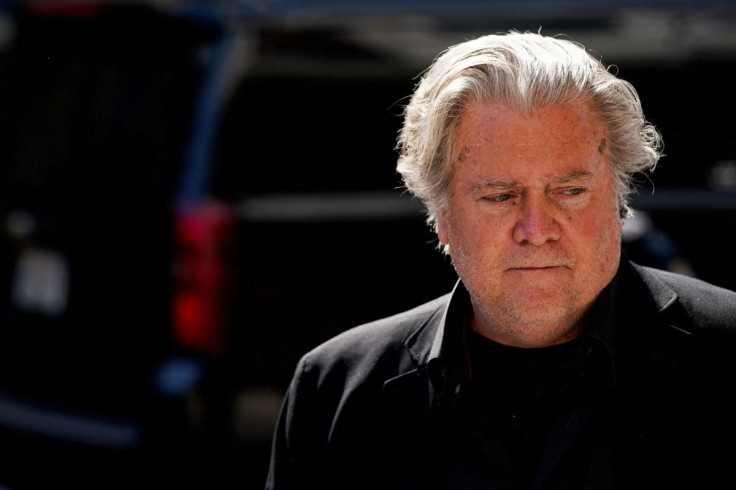Trump Ex-adviser Bannon's Contempt Of Congress Trial Begins With Jury Selection

Jury selection began on Monday in the criminal trial of Steve Bannon, Donald Trump's former aide, for defying a subpoena from the congressional committee probing the Jan. 6 attack on the U.S. Capitol by a pro-Trump mob.
Bannon, 68, is facing two misdemeanor counts of contempt of Congress after he declined last year to provide testimony or documents to the Democratic-led House of Representatives select committee.
A jury of 12 and two alternates will be selected on Tuesday morning. Opening arguments are expected to follow.
Bannon had previously unsuccessfully tried to persuade U.S. District Judge Carl Nichols to delay the trial, arguing that the committee's high-profile public hearings could make it harder to assemble an impartial jury.
The committee presented evidence last week that Bannon spoke with President Trump at least twice on the day before the Jan. 6, 2021, attack. The committee also played a clip of Bannon saying on a right-wing talk show on Jan. 5 that "all hell is going to break loose tomorrow." Bannon made those comments after his first call with Trump, the committee said.
Nichols allowed one woman to remain as a potential juror even though she said she had watched the committee's hearings, despite objections from Bannon's defense. The judge noted that the woman indicated she had not prejudged the case, adding that "the mere fact of media coverage is not enough" to exclude her.
A handful of people considered as potential jurors expressed negative sentiments toward Bannon or strong feelings about the attack against the U.S. Capitol and were excluded from the panel.
"I've formed an opinion about the case," one man told the judge, adding, "Bannon is guilty."
The committee plans to hold another hearing on Thursday evening, aimed at reaching a broad television audience. Bannon's trial will likely still be going on at that point. Nichols said on Monday it could extend into next week.
Bannon has argued that the material sought by the committee was protected by a legal doctrine called executive privilege that can keep certain presidential communications confidential.
Trump told Bannon this month he was waiving any executive privilege claim.
Bannon reversed course this month and said he wanted to testify before a public committee hearing, nearly 10 months after defying the subpoena. There has been no indication of any plan to have him do so, as the committee likely would want him to first testify in closed sessions in order to cover a wide range of matters.
Nichols has ruled that Bannon cannot use executive privilege as a defense and cannot claim he relied on his attorney's advice when he declined to testify or provide records. Nichols has left open the possibility that Bannon could present evidence of his recent offer to cooperate with the panel as a defense.
Trump's supporters attacked the Capitol in a failed effort to block formal congressional certification of his 2020 election loss to Democrat Joe Biden.
As a top adviser to the Republican Trump's 2016 presidential campaign who later served as White House chief strategist, Bannon helped articulate the "America First" right-wing populism and fierce opposition to immigration that helped define Trump's presidency.
Bannon separately was charged in 2020 with defrauding donors to a private fund-raising effort to boost Trump's project to build a wall along the U.S.-Mexican border. Trump subsequently issued a pardon to Bannon before that case could go to trial.
© Copyright Thomson Reuters 2024. All rights reserved.





















